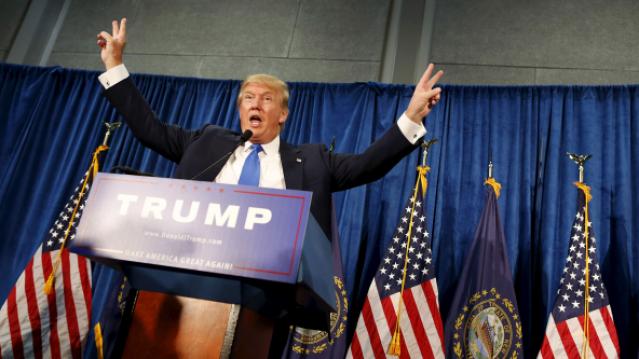Donald Trump Isn’t as Rich as He Says…but He’s Still Pretty Rich

“I’m really rich,” Donald Trump boasted last month when he announced he was running for president. A new analysis by Bloomberg confirms that claim, but finds that the real estate mogul and presidential candidate is worth about $7 billion less than he claims.
When he announced his presidential bid, Trump touted a net worth of about $8.7 billion, a figure that soon ballooned to $10 billion. But Bloomberg calculates his wealth closer to around $2.9 billion. The Bloomberg Billionaires Index, a daily ranking of the world’s biggest fortunes, arrived at the value using both prior-known information and a 92-page personal disclosure form that Trump filed with the Federal Election Commission.
Related: 7 Revelations from Donald Trump’s Financial Disclosure
The federal form that all presidential candidates are required to submit asks only for broad ranges in asset values, not specific sums. Anything above $50 million in value is lumped together in one category, which in Trump’s case left plenty of room for questions about just how valuable some of his assets are. The federal report also doesn’t require candidates to list personal property like art, clothing or real estate that’s for his own use.
The Bloomberg analysis went into much more depth, using figures such as purchase dates, square footage, rental rates and more.
The disclosure form revealed that most of Trump’s fortune comes from real estate holdings, such as the Trump Doral resorts in Florida and Trump Tower on Fifth Avenue in New York City. Other lucrative properties include premier golf courses in the U.S., Ireland and Scotland.
Related: Donald Trump Just Showed Why His Campaign Is Doomed
Trump had valued his golf and resort properties at $2 billion. Bloomberg, using price-to-sales ratios for similar properties, put the value at a combined $570 million.
The Bloomberg methodology also doesn’t put much value in the Trump brand, counting only the cash being held as part of licensing or other business deals. “Trump’s own estimations,” Bloomberg noted, “include much higher values for his brand.”
Top Reads from The Fiscal Times:
- Huckabee Trounces Trump in the Shameless Shock Game
- You’re Richer Than You Think. Really.
- 15 Facts You Didn’t Know About Donald Trump
Increasing Number of Americans Delay Medical Care Due to Cost: Gallup

From Gallup: “A record 25% of Americans say they or a family member put off treatment for a serious medical condition in the past year because of the cost, up from 19% a year ago and the highest in Gallup's trend. Another 8% said they or a family member put off treatment for a less serious condition, bringing the total percentage of households delaying care due to costs to 33%, tying the high from 2014.”

Number of the Day: $213 Million

That’s how much the private debt collection program at the IRS collected in the 2019 fiscal year. In the black for the second year in a row, the program cleared nearly $148 million after commissions and administrative costs.
The controversial program, which empowers private firms to go after delinquent taxpayers, began in 2004 and ran for five years before the IRS ended it following a review. It was restarted in 2015 and ran at a loss for the next two years.
Senate Finance Chairman Chuck Grassley (R-IA), who played a central role in establishing the program, said Monday that the net proceeds are currently being used to hire 200 special compliance personnel at the IRS.
US Deficit Up 12% to $342 Billion for First Two Months of Fiscal 2020: CBO

The federal budget deficit for October and November was $342 billion, up $36 billion or 12% from the same period last year, the Congressional Budget Office estimated on Monday. Revenues were up 3% while outlays rose by 6%, CBO said.
Hospitals Sue to Protect Secret Prices

As expected, groups representing hospitals sued the Trump administration Wednesday to stop a new regulation would require them to make public the prices for services they negotiate with insurers. Claiming the rule “is unlawful, several times over,” the industry groups, which include the American Hospital Association, say the rule violates their First Amendment rights, among other issues.
"The burden of compliance with the rule is enormous, and way out of line with any projected benefits associated with the rule," the suit says. In response, a spokesperson for the Department of Health and Human Services said that hospitals “should be ashamed that they aren’t willing to provide American patients the cost of a service before they purchase it.”
See the lawsuit here, or read more at The New York Times.
A Decline in Medicaid and CHIP Enrollment

Between December 2017 and July 2019, enrollment in Medicaid and the Children's Health Insurance Program (CHIP) fell by 1.9 million, or 2.6%. The Kaiser Family Foundation provided an analysis of that drop Monday, saying that while some of it was likely caused by enrollees finding jobs that offer private insurance, a significant portion is related to enrollees losing health insurance of any kind. “Experiences in some states suggest that some eligible people may be losing coverage due to barriers maintaining coverage associated with renewal processes and periodic eligibility checks,” Kaiser said.

